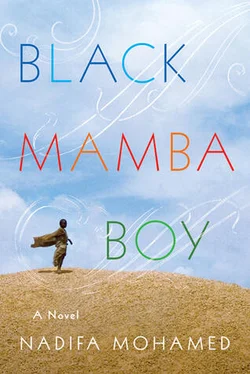Mahmoud took a deep breath and said bismillah before biting into a slab of bread and meat. “I was just telling these boys to go home, to stop wasting their time here,” Jeylani said.
Mahmoud waggled his head. “Oh, they won’t stop until they have tried and exhausted their luck. I didn’t either, only after the seventh failed attempt to cross to Port Said did I give up.” Mahmoud laughed. “Each time I walk, they pick me up, I walk, they pick me up; my feet were cut to shreds!” he said, lifting up his black army boots. “If you two are desperate to get to Egypt and have better luck than me, I will tell you everything I know, no one knows that route better than me.”
Then Mahmoud began a finely nuanced recital of roads that led to Egypt, referring to an internal map that included humps in the sand, electricity pylons, noteworthy bird’s nests, forks in sandy paths, and shallow marshes in the Red Sea. So detailed, in fact, that Jama and Liban had to ask him to repeat everything from the beginning; they could not read or write but they memorized everything with a skill found only in the illiterate. He ordered Jama and Liban to follow the coastline of Palestine during the day and sleep in villages at night, and to avoid any wealthy areas.
With the few pounds they had collected in their pockets, they left Sarafand and began to walk. Jama was still tempted to turn in the opposite direction and go to Jordan and then Mecca to perform the hajj, but Liban would not hear of it, and deep down Jama was frightened of going alone. Only later in life do we see the tugs of fate with clear eyes, the minute delays that lead to terrible loss, the unconscious decisions that make our lives worth living; fate told Jama to head west to Egypt, and he listened.
The Palestinians they came across were not recognizable from the portrait of irascible bigots that Joe Louis had painted. Each night Jama and Liban turned inland and went to the nearest village, and each night they were accepted and led to the beyt al-deef, the guesthouse that every village, however poor or remote, maintained. The hospitality was usually brisk and businesslike but very generous; every household brought something: bread, water, meat, eggs, milk, fruit, dates, rugs and blankets. No questions were asked of the strange boys and no one reported their presence to the police, they treated Jama and Liban as otherwordly spirits who would report their compassion or meanness to a higher authority. The lingering awkwardness between them following their argument on the bus dissipated in the comfort they found in the beyt al-deef. They talked late into the night under the goat-hair blankets. Liban told Jama that he had six older sisters, that his parents were musicians, and that he had served in Eritrea but had avoided the battles; if he weren’t Yibir his life would have been enviable. The journey to the Egyptian border was almost fun. The long day’s walking gave them a purpose and they competed to see who could go faster, while at night they relaxed and enjoyed the grilled lamb and rice. Near Khan Yunis, they stopped to rest at a village and found a wedding in full flow, and the guesthouse occupied by a band armed with ney, darbucka, oud, and kanun. They hovered at the entrance, listening to the songs, until the singer beckoned to them to sit down and they crept in. The music thumped at the walls and glided over them and out through the window. After a large meal of mansaf, the men went out to perform the dabke, twirling handkerchiefs over their heads. The musicians whipped the guests into a frenzy, the beats on the darbucka working faster and faster, until Jama and Liban lost all shyness and added their feet to the dancing centipede. Unlike in Somaliland and Eritrea, the Muslim men and women here celebrated separately, but the chants and piercing ululations of the women could clearly be heard even when the men began to tire and drift away. When the bride arrived, she was a sight to behold, seated sideways on a white horse, her head covered by a shawl twinkling with coins, her proud mother, aunts, and sisters flanking her in gorgeous dresses. Bethlehem would have looked so beautiful in those clothes, thought Jama, regretting his own rushed wedding. The bride took all attention away from the musicians and only then did they quieten down, playing delicate wedding songs as Jama and Liban laid out their rugs under the stars.
They walked beyond Khan Yunis, and a few hours later crossed the border into Egypt. On the outskirts of Al-‘Arish, they waded far into the Mediterranean to scrub their filthy bodies, and had a quick snooze under a palm tree. They chased each other to Romani, and were delighted to find there the pylons that Mahmoud had described. It was the last outpost of civilization; there were no more villages to sleep or be fed in until they crossed the Suez Canal. By the sea at Romani, they nervously approached a group of fishermen resting around a fire, pushing each other to speak to them. Jama asked for any leftovers they might have but the fishermen gesticulated to the empty bowls and fish bones. One man passed over his bowl and Jama handed the tiny handful of rice to Liban, expecting another bowl to be forthcoming, but there wasn’t, and within a few seconds Liban had wolfed it all down. Jama would have kicked Liban if the fishermen weren’t watching, but they laughed at the choked-down annoyance in his face. They passed fresh water to Jama, and he drank enough to fill out his stomach before handing it to Liban.
“Where you boys from?” they asked.
“We’re Egyptian. We wanted to find work in Palestine but the police told us to go back, so we’re walking to Port Said,” Liban lied, afraid they would alert the beret-wearing Egyptian police camel corps.
From Romani to Port Said was the deadliest, most treacherous part of the journey, forty miles of sand dunes and lifeless rock. There was just sea on one side and murderous desert on the other. They would not be able to find food or water, and if they were caught by the midday sun or the camel corps, they were finished. Mahmoud had warned that Somali skeletons lay on that stretch of sand, and it was the most perilous journey of all the journeys in Jama’s life. Liban and Jama decided to rest hidden in the sand until sunset so that they could travel in the cool night and evade the police patrols. Sunset came and they scuttled out of the sandbank like crabs, the moon lighting the way forward and the crash of waves applauding their progress. It was too dangerous to enter Romani and buy food and water, and they would lose precious hours of darkness, so they decided to struggle on until Port Said. The beyt al-deefs had lulled them into dangerous nonchalance but now they felt superhuman, too defiant to think about turning back.
Jama turned to Liban and said, “If I can’t walk with you, don’t wait. And if you can’t walk, I won’t wait for you, I’ll go on so at least one of us can survive.” They shook hands and carried on side by side.
Neither fell back, their desire and hunger were too strong, their paces identical, unstoppable. In sixteen hours they walked more than forty miles, they resembled two slivers of soul light more than men made of flesh and blood. They broke the tenets of human survival: dehydrated, starved, exhausted, they did not stop, they would not stop until they got to Port Said. The land began to fragment into reedy marshes as they reached the end of the Sinai. Jama and Liban held on to each other when they saw how close they were to their promised land, the white light of the Port Said lighthouse calling them in.
A salt lake yawned between them and Port Fuad. Mahmoud had told them it was too deep to cross except at one point, where the pylons were planted on each bank. Mahmoud’s memory was photographic, and as he had said, the water between the pylons was shallow and thick with salt. They waded slowly across, both frightened of the water, which reached above their waists. Jama crossed the Red Sea with his father’s battered suitcase held up over his head and his heart in his mouth. They reached the other bank panting with relief and excitement, they had performed a feat of human endurance, but the Nubian man shouting “Hey, Hey!” and running at them with a stick had no concern for that. The Nubian chased Jama and Liban, caught the weak men in his strong hands, put them in a car, and drove them to a nearby villa.
Читать дальше
Конец ознакомительного отрывка
Купить книгу












